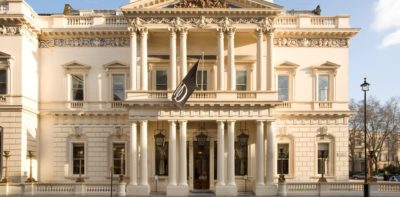
Institute of Directors.
British business leaders have teamed up with their Irish counterparts to urge politicians to make maintaining a strong trading relationship between the two countries a high priority in the upcoming Brexit negotiations. A new report – The Irish Question: Brexit, business and the future of UK-Ireland relations – for the first time combines surveys from the Institute of Directors in the UK and IoD Ireland (which are separate organisations). The results highlight the deep economic links between the two countries, with a third of the UK companies questioned, and three-quarters of Irish firms, doing business across the border.
Ireland is the only EU country with which the UK shares a land border, making it a key test for the success of upcoming Brexit talks. One in ten IoD members in Northern Ireland, and a quarter of IoD Ireland members have employees who commute across the border. A majority of IoD members from across the UK want to see the common travel area between the two countries maintained. Both the UK and Irish governments have stated they do not want a ‘hard’ border, but the report points out this will need to be negotiated as part of a broader Brexit deal with the EU.
Key survey results:
- Over half of IoD members based in Northern Ireland say delays at the border would be negative for their business, while none think this would be a positive development.
- Northern Irish firms are at the sharp end of the pound’s fall against the Euro since the EU referendum. Even though some exporters will benefit from a cheaper pound, two-thirds of IoD NI members saying exchange rate volatility is having a negative effect on them.
- Perhaps because of the their need to do business in the Republic, a majority of IoD NI members think Brexit will make the red tape burden worse.
Seamus Nevin, Head of Employment and Skills Policy at the Institute of Directors, said:
“Leaving the EU will be probably the most cumbersome legislative task ever undertaken by a British Government. Because of the deep historical and economic ties, one of the knottiest issues of all is the UK’s future relationship with the Republic of Ireland.
“This will be the litmus test for Brexit. If the Government can overcome the many intricate and complicated difficulties Northern Ireland presents for Brexit, they will have gone a long way to ensuring the best possible outcome for the whole United Kingdom.”
Ian Sheppard, Chairman at Northern Ireland Institute of Directors, said:
“Northern Ireland is unique as the only region of the UK having a land border with the EU. IoD members in NI are extremely concerned on what the impact of Brexit will mean for the free movement of people and goods across this border. It is vitally important that the UK government takes on board our members’ concerns during the negotiating process and seeks to ensure that free movement is retained.”
The report lays out the depth of integration between the UK and Ireland and reveals potential points of friction in Brexit negotiations:
- Over £1bn in goods and services are exchanged between the Republic of Ireland and the UK every week.
- Trade between Northern Ireland and the Republic of Ireland is worth £2.2bn per year.
- 30,000 people cross the Northern Ireland-Ireland border every day. 14,800 persons habitually commute between Northern Ireland and the Republic for work or study
- Brexit could hit television and movie productions such as Game of Thrones and Star Wars. The EU maintains protectionist exemptions from free trade agreements for certain sectors, including cultural industries. This could create significant problems for the 250 cross-border movie, television and radio companies who are currently part of a thriving all-Ireland industry.
- Both the UK and Irish governments have said they plan to revert to the Common Travel Area (CTA). However this is not cut-and-dried as the EU seeks to prohibit third-party states from giving the citizens of one EU member state preferential treatment.
With the exception of football, all sports are organised on an all-Ireland basis and have a single national representative team. If the above issues are not resolved athletes representing Ireland may require travel visas to represent their own country in sport.
Click here to visit the Press Release